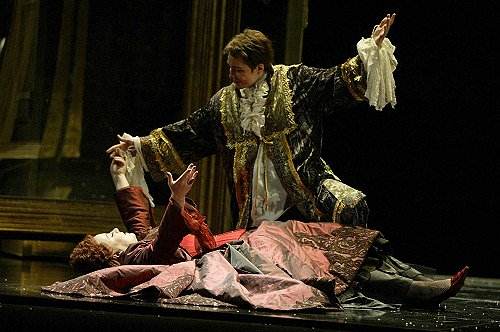S & H Opera Review
Handel, ‘Alcina,’ English National Opera, London Coliseum, Saturday April 26th 2003 (ME)
A huge popular success at its London premiere in 1735, ‘Alcina’ impressed an audience who loved elaborate and extravagant stage effects as much as they appreciated beautiful music, and the sorceress’ realm has always held a fascination, mainly because within its illogical and ‘fantastick’ framework we see and hear the all too human frailties of Alcina and her lovers. I first saw the ENO production when it was new in 1999, and it has lost nothing of its rather louche charm and appropriately dislocated world view: it’s the sort of thing which brings a certain type of critic out in hives, with its kitschy décor, variously camp dancers and general air of androgynous dissipation – needless to say, I loved it. However, although the production itself has hardly altered, there has been a sad loss on stage, and that is in the singing, which, at least on this showing, was worryingly poor in quality, with very few exceptions. There are so many great Handel singers around at the moment that it seems strange that ENO cannot choose some from their ranks, as they certainly did the last time this production was seen.
The most significant loss concerned the Alcina, in the last run sung and acted with every kind of Handelian grace by Joan Rodgers, completely convincing both as evil sorceress (how we shuddered when she summoned up her minions!) and as forlorn lover: this time around we had another possessor of a lovely soprano voice, Lisa Milne, but she was completely miscast in this role – she was a superb Morgana last time, with the audience eating out of her hand during ‘Come take me in your arms,’ but as Alcina both her voice and person were inappropriate. She looked much more like Tosca than Alcina, striking the kind of poses which might lead into ‘Vissi d’arte’ and her general stage presence is more Queen Victoria than Queen of the Night. She did sing beautifully, but in a tone of general overall creaminess which hardly suggested Alcina’s divided soul.
It was the same sad story with the Ruggiero: few who saw and heard Sarah Connolly’s superb assumption of the role will easily forget how completely convincing she was in every way, singing with liquid tone and sublime agility as well as presenting an utterly credible personality: in this revival the part was taken by the American mezzo Deanne Meek, who has a very light, silvery voice, almost entirely without the richness in the lower register which is needed to carry off this role. Ms Meek’s person is gentle and attractive but her voice is so tiny that it simply cannot command a house of this size: she sang a very small-scale, sweetly phrased ‘Verdi Prati’ but overall her characterization and singing were muted and not at the level one expects of Handel singing in this house. Those ‘Prati,’ incidentally, were not exactly ‘Verdi,’ looking more like the burnt stooks one might see in a Nikolaus Lenhoff production of ‘Katya Kabanova’ and one might be forgiven for wondering what the point was of having the singer bemoan the eventual decay of the fields, when that decay seems already to have occurred.
The other major roles fared rather better, with Laura Claycomb’s Morgana very engaging and brightly sung even if not quite obliterating memories of Lisa Milne, and Charlotte Hellekant’s Bradamante showing even, burnished tone and highly committed acting. Mark Richardson was a reliable Melisso, Andrew Mackenzie-Wicks under-powered as Oronte, and Gail Pearson an endearing Oberto. Unfortunately, the general level of singing was so under par that I found myself muttering ‘too many repeats’ several times: if a singer cannot negotiate a highly decorated line the first time, why inflict it on us, with variations, as many as eight more times?
Orchestrally, things were a bit brighter, with Richard Hickox driving the players on with his usual enthusiasm, and some sparkling accompaniment from the continuo, especially Martin Pacey’s harpsichord. However, it still seemed like a very long evening: those puckish fairies, louche denizens of the faery realm and juxtapositions of eighteenth century urbanity with frivolous fancy still entertain and give a fitting framework to this essentially absurd piece, but this is Handel, and if most of the singers don’t have the necessary technique then the delights of the stage are merely hollow masquerades.
Melanie Eskenazi
Lisa Milne as Alcina / Deanne Meek as Ruggier
Handel's Alcina directed by David McVicar.
Credit: Alastair Muir
English National Opera / Revival Production of Alcina.
First performance: Wednesday 16 April 2003 at the London Coliseum.
